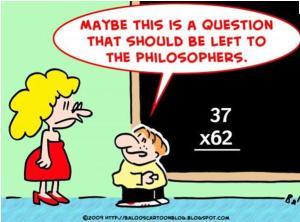This is a huge topic – closely related to some of the Theory of knowledge concepts. It also gets very complicated. Here are some of the basics (some of this information is simplified from the Stanford Encyclopedia which goes into far more detail).
1) Platonism
The basic philosophical question in maths is ontological – ie concerned with existence. The Platonic school (named after Greek philosopher Plato) hold that mathematical objects can themselves be said to exist. Is there a “perfect circle” – in the realm of “ideas” upon which all circles on Earth are simply imitations? Is this circle independent of human thought? Does pi exist outside of human experience – and indeed space and time? The hard Platonists argue that mathematical structures themselves are physically real – and indeed that our universe may be a mathematical structure. (“Was mathematics Invented or Discovered”)
Some other schools of mathematical philosphy include:
2) Logicism
Logicism seeks to reduce all of mathematics to logical thought – if all mathematics is reducible to logic does that mean that mathematics is purely an intellectual exercise? 20th Century efforts by Bertrand Russell and others to reduce mathematics to logical statements have not enjoyed much success.
3) Intuitionism:
“According to intuitionism, mathematics is essentially an activity of construction. The natural numbers are mental constructions, the real numbers are mental constructions, proofs and theorems are mental constructions, mathematical meaning is a mental construction… Mathematical constructions are produced by the ideal mathematician, i.e., abstraction is made from contingent, physical limitations of the real life mathematician. But even the ideal mathematician remains a finite being. She can never complete an infinite construction, even though she can complete arbitrarily large finite initial parts of it.” (Paragraph from Stanford).
Mathematics therefore does not really exist in any physical sense – it is merely a construction of the mind.
4) Fictionalism:
“Fictionalism holds that mathematical theories are like fiction stories such as fairy tales and novels. Mathematical theories describe fictional entities, in the same way that literary fiction describes fictional characters. This position was first articulated in the introductory chapter of (Field 1989), and has in recent years been gaining in popularity.” (Paragraph from Stanford).
This line of thought tries to explain the amazing effectiveness of mathematics in describing the real world in a novel way – by denying that it does! The reality that we think is being described by mathematics is nothing more than fiction – there is an underlying reality which we know nothing about. Think about Nick Bostrom’s Computer Simulation argument – if we were within a computer simulation, then our mathematical laws may very well explain the computer code – but the real reality would be that which existed outside the computer.
Student resources:
1) Exploration Guides and Paper 3 Resources

I’ve put together four comprehensive pdf guides to help students prepare for their exploration coursework and Paper 3 investigations. The exploration guides talk through the marking criteria, common student mistakes, excellent ideas for explorations, technology advice, modeling methods and a variety of statistical techniques with detailed explanations. I’ve also made 17 full investigation questions which are also excellent starting points for explorations. The Exploration Guides can be downloaded here and the Paper 3 Questions can be downloaded here.
